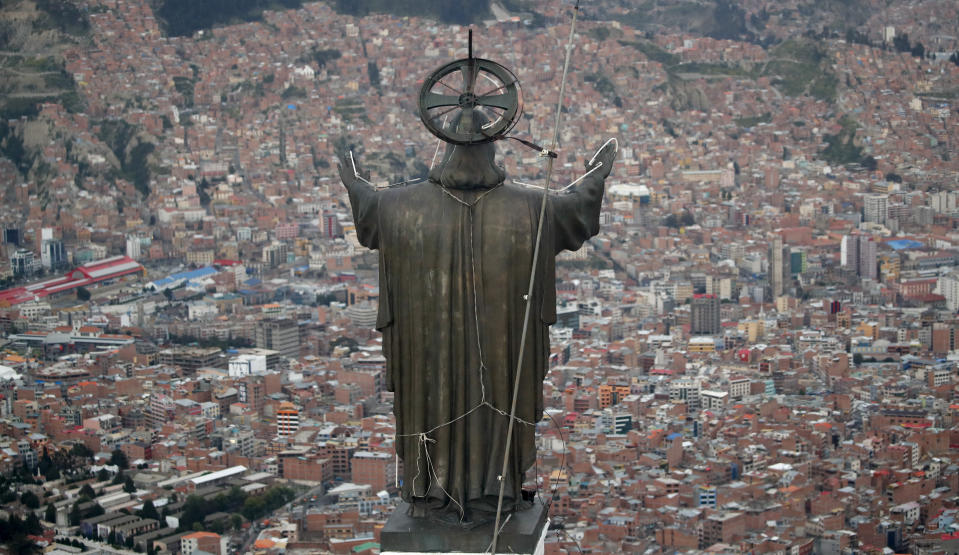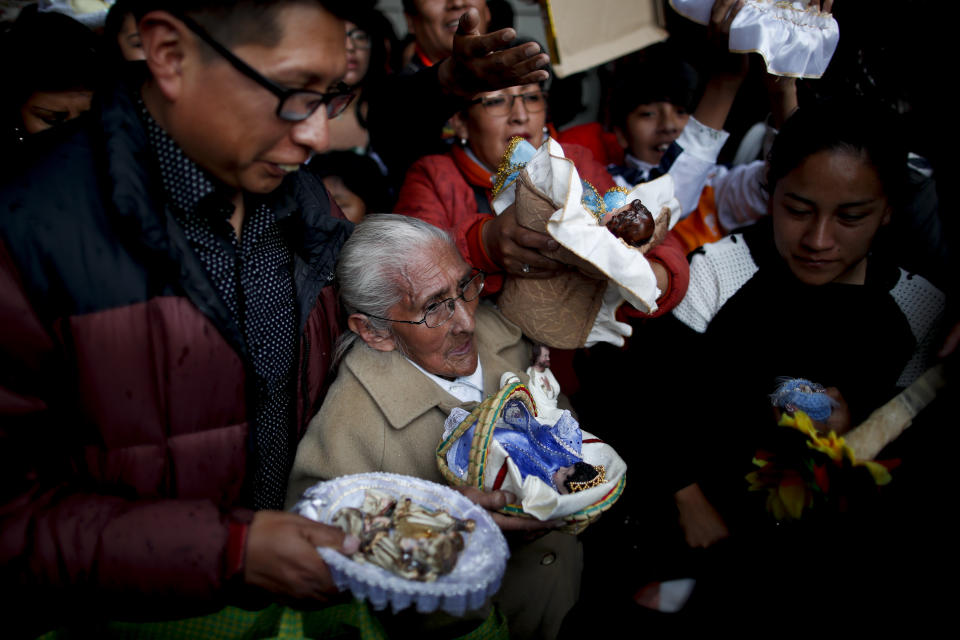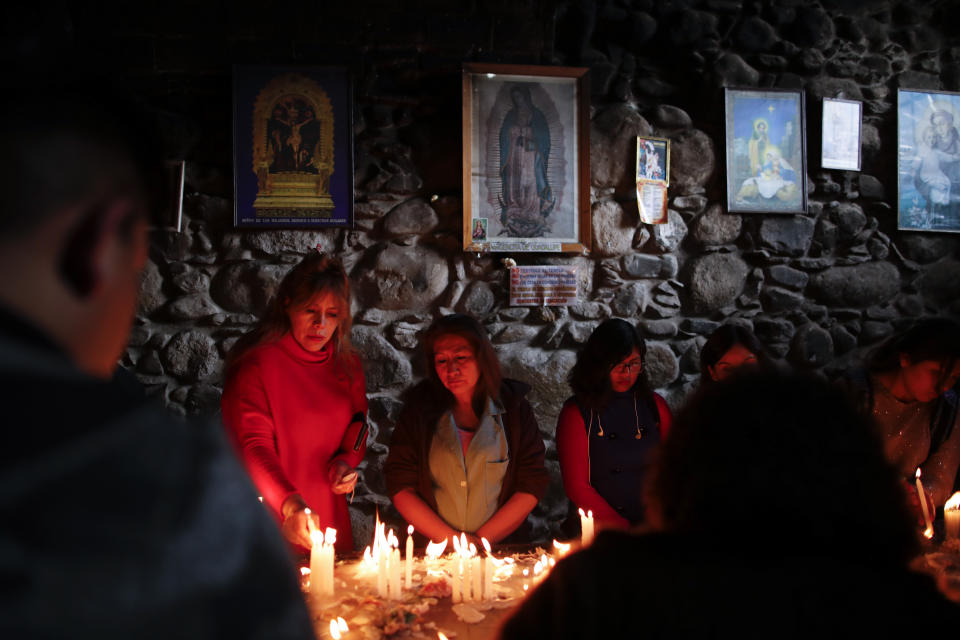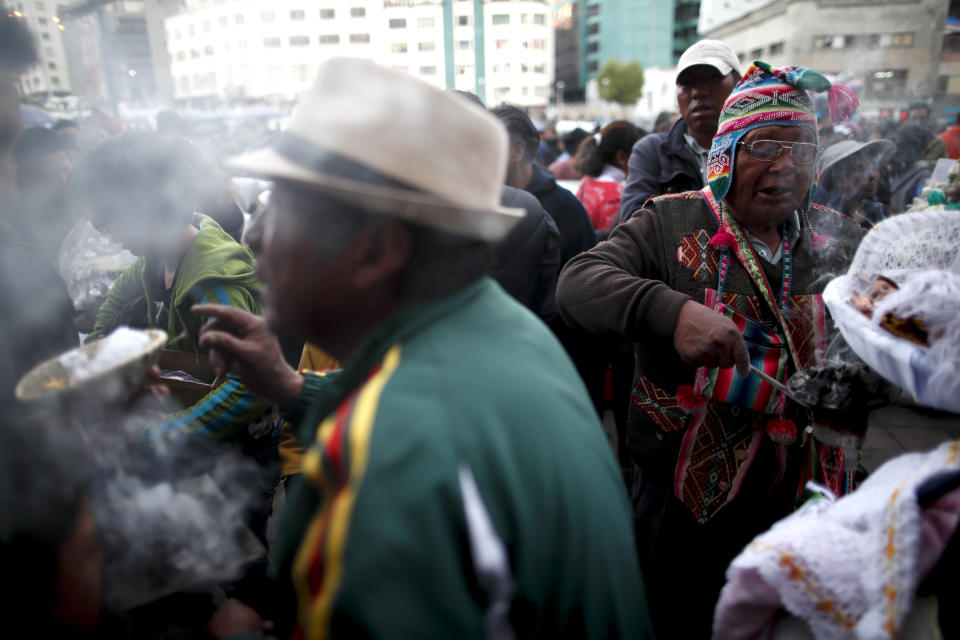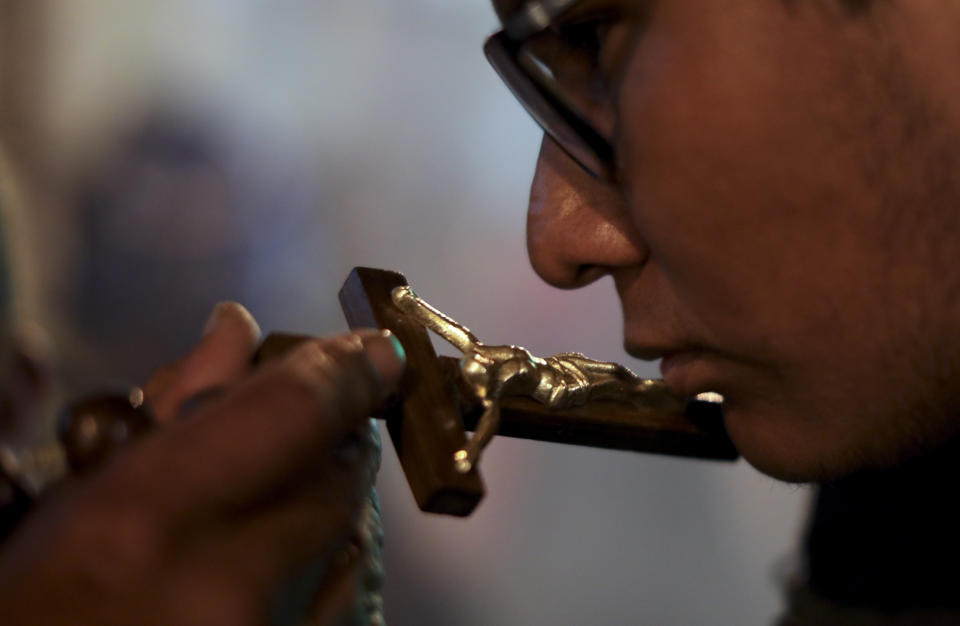Bible vs indigenous beliefs at issue in Bolivia
LA PAZ, Bolivia (AP) — Hoisting a large leather Bible above her head, Bolivia’s new interim president delivered an emphatic message hours after Evo Morales fled under pressure, the end of a nearly 14-year presidency that celebrated the country’s indigenous religious beliefs like never before.
“The Bible has returned to the palace,” bellowed Jeanine Añez as she walked into the presidential palace where Morales had jettisoned the bible from official government ceremonies and replaced with acts honoring the Andean earth deity called the Pachamama. The conservative evangelical senator, from a region where people often scoff at Pachamama beliefs, thrust the Bible above her head and flashed a beaming smile.
While Bolivians of all walks of life are deeply divided on Morales' legacy, his replacement, a lawyer and opposition leader who wants to make the Bible front and center in public life, is reigniting deep-rooted class and racial divisions at a time of great uncertainty in the Andean nation, where 6 in 10 identify as descendants of native peoples.
“It’s the same as 500 years ago when the Spanish came and the first thing they showed the indigenous people was the Bible,” said Jose Saravia, a civil engineer from La Paz. “It seems to me like the same thing is happening again.”
Like many in Bolivia, Saravia is a practicing Catholic who weaves in Pachamama beliefs passed down from this parents and grandparents. About 8 in 10 in Bolivia are Catholic, according to the most recent estimates.
Saravia and his family were among droves of people who came carrying their immaculately dressed baby Jesus dolls to fill a massive Catholic church in La Paz to participate in Three Kings Day masses Jan. 6. As they slowly left the church, a Catholic priest splashed their relics with holy water.
Just feet away from the church in a bustling plaza, parishioners stopped to have their dolls blessed by indigenous elders wearing their customary poncho sweaters and wool stocking hats in an act Bolivians believe shows respect for Pachamama and bring blessings in return. The men rang tiny bells as they placed the dolls in incense smoke billowing from small pots full of hot coals and special herbs, many ending the act with a sign of the cross and a kiss of a small cross.
A symbiotic relationship has emerged over time. It allows Catholics and Pachamama believers to maintain both systems, said Mariano Condori Flores, one of the indigenous guides doing the blessings.
Condori said the same type of relationship doesn’t exist with evangelicals, who tend to take a hardline against mixing beliefs and account for about 7% of the population, more than double their size in 1970, according to a self-reported membership figures compiled by the World Christian Database.
“It doesn’t seem like Añez understands that we exist,” Condori said.
For many upper-class conservatives in the capital of La Paz, and in outlying provinces where people grew tired of Morales’ heavy-handed campaign to increase visibility and prominence of the indigenous religious beliefs, Añez's reintroduction of the Bible is being celebrated.
“It was a demonstration of grand respect for Bolivian people. We are believers in God,” said Karina Ortiz Justiniano, a psychologist from the province of Beni where Añez resides. “The government of Evo Morales was way too aggressive, especially for those of us here in the oriental region that don’t believe in the Pachamama.”
Sentiments like that provoke strong reaction from Bolivians who embrace their Incan heritage. They fear that the discrimination they felt under previous presidents of European descent will return to this South American country of 11 million people situated between Peru, Chile, Brazil and Argentina.
Añez will likely only hold the office until May 3, when the country holds another election, but critics say she represents Bolivian archetype that flourished before Morales became the nation’s first indigenous president in 2006.
Morales commonly railed against what he considered discrimination that dated back to the Spanish conquest in 1520, describing his presidency as the “decolonization” of Bolivia.
Morales revamped the Bolivian constitution in 2009 to make the country a secular state, stripping special recognition previously given to the Catholic church. None of the presidential candidates for the May election mentioned rolling back Morales’ changes to the constitution.
Añez declined to be interviewed by The Associated Press but told a Bolivian newspaper in December that she will respect indigenous beliefs. But she said if Christians like her had to endure the Bible being taken out of the presidential palace, now others should respect her devotion to God.
Edwin Sanchez Mansilla, who owns a shop in La Paz called “Question of Faith,” to repair religious relics, said Añez’ celebration of the Bible returning ignited a spike in business as people felt compelled to connect to their religious roots. He said he’s not worried that Bolivia will lose its indigenous culture.
“We’ve had these customs for a long time, Evo Morales didn’t invent them,” Mansilla said. “With or without Evo, we’ll continue. We have strong roots.”
___
Associated Press religion coverage receives support from the Lilly Endowment through the Religion News Foundation. The AP is solely responsible for this content.

